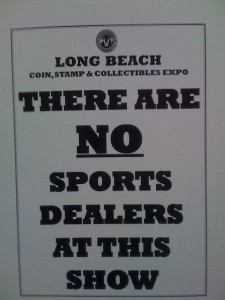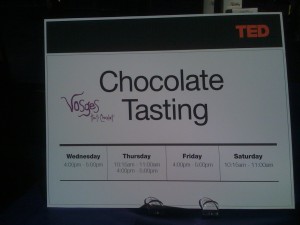Questions for a TED attendee (#TED)
(See all of MIT Sloan Management Review’s coverage of TED.) The last session of the day, the awarding of the TED Prize, has ended. I’ll post an overview of the long day’s sessions tomorrow morning. For now, a few people have written me today, so I’ll answer their questions and try to give a sense of what it’s like being at the event.
(See all of MIT Sloan Management Review’s coverage of TED.)
The last session of the day, the awarding of the TED Prize, has ended. I’ll post an overview of the long day’s sessions tomorrow morning. For now, a few people have written me today, so I’ll answer their questions and try to give a sense of what it’s like being at the event.
What’s the new venue like?
This note came from someone who attended a few TEDs when it was held at the smaller Monterey Convention Center. It’s much more spread out. At Monterey, where TED was held since the mid-’80s, it felt like most of the attendees stayed at two hotels, both of which were connected to the Convention Center.
One of the benefits of moving to Long Beach is that everyone can be in the same room now. The auditorium in Monterey had seats for only 400 or so, which meant that most of the attendees relaxed in simulcast rooms with plush chairs and big screens. The networking made it worthwhile to go anyway, but the idea of spending thousands of dollars to plop down in front of a big TV screen is a bit nuts. For an event that’s supposed to be about guiding a community, it helps to have the community all together.
I wrote earlier that the more spread-out environment makes it feel like TED has taken over the city. It hasn’t, though. Right next door to where TED is held you can attend a very different event.

For the record, there are no sports dealers at TED either, to my knowledge.
Is all this save-the-world stuff for real?
I got this note right after the TED Prize simulcast ended — those awards are the apotheosis of TED’s do-goodism. There are plenty of things a reasonable person could argue against TED — the inevitable elitism that comes with the high entry fee and the occasional self-congratulatory tone come to mind — but by adopting a web-centric “ideas worth spreading” meme, TED curator Chris Anderson and his team have worked hard to make the ideas expressed at TED as available as possible. Most TED talks are available for free on the TED website. An official blog and Twitter feed is following the events of the conference in near-real-time, as are dozens or so unvetted ones. You don’t have to be here to know much of what’s going on here. TED can’t fix the world. No mere conference can. (Indeed, as it did last year, the even more elite Davos conference this year seemed to be full of leaders just throwing up their hands.) Anderson’s goal is transformational change, and the simple act of sharing transformational ideas — first to a room of elites and then to the growing percentage of the world with Internet access — lets them take root in unexpected places. But it is true that, when not changing the world, TEDsters are indulging themselves:

What’s Al Gore really like? (Note: no one actually asked this question, but I’m answering it anyway.) I don’t know. He gets a much better seat than I do: even at an elitist event like TED, there is a hierarchy. I can tell you what he talked about, though. He extended his Inconvenient Truth argument with updated data that makes it sound like we are all doomed. As noted before, this is a conference for optimists and Gore’s day job is as a venture capitalist so he must believe there are solutions, but at least in the latest version of his talk, he’s not offering any optimism.
And now on to the evening’s remaining events.
Do you have (real) questions? Ask them in the comments below and I’ll get to them as soon as I can.
